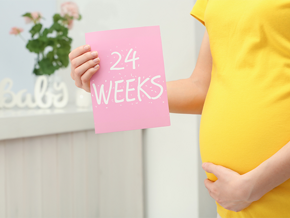
9 Weeks Pregnant: How to Stay Healthy for You and Your Little One
You're 9 weeks pregnant, which means you'll soon say goodbye to the first trimester. Time flies, right? Your baby bump may not be showing yet, but your body is working overtime behind the scenes.
Let's see how your little one is developing and what you can do to stay physically and mentally healthy.
Your Baby's Development at 9 Weeks
At 9 weeks pregnant, your baby's size is that of a duhat or grape, around 2.5 cm long—that's less than an inch!
During an ultrasound, you'll see your little one's head has started to take on its round shape, and the little tail at the end of the spine has almost disappeared. They can now get measured from crown to rump (tailbone) or from head to heel.
Here's what else is happening with your baby:
- Your little one's heart, brain, kidneys, and liver continue to develop and mature.
- The diaphragm, which will help them breathe later, is now in place, separating the chest from the tummy.
- Tiny fingers and toes are starting to take shape, although it will take a few more weeks for the bones to harden.
- Their eyelids have formed, but they're still closed.
- They've begun to develop taste buds!
- Your baby's heart is also pumping fast at about 100 to 160 beats per minute.
By the way, your baby's rate can speed up even more if you're feeling stressed. So, don't feel guilty if you need a day to charge your social batteries or want to sleep in when you find yourself tired or anxious.
9 Weeks Pregnant: Symptoms to Expect

If you're 9 weeks pregnant and bleeding heavily with painful cramps, head to the emergency room.
Just by looking at you, many people still wouldn't be able to tell that you're 9 weeks pregnant by belly size. You, however, will definitely know as your hormones surge and so do the symptoms. Here's what you might notice:
Sore breasts
Your breasts may feel heavier and appear larger, thanks to hormonal changes that are causing your milk ducts to expand. You may also notice visible veins and darkening areolas due to the increased blood flow in your body.
Nausea and vomiting
Morning sickness can occur at any time of day. But it often peaks around Week 9 of pregnancy due to high levels of pregnancy hormones like human chorionic gonadotropin (hCG).
Fatigue
Your body is using a tremendous amount of energy to develop the placenta and support your growing baby. So don't be surprised if you feel extreme exhaustion. Plus, the mood swings (one minute you're irritable, the next you're weepy) make you tired.
Bloating and gas
Your digestive system may be slowing down due to progesterone, which can cause bloating after even small meals.
Spotting
A light brown discharge at 9 weeks pregnant is common, and it may come with mild cramping (like period pains). But, if you experience heavy red bleeding or painful cramps, call your doctor as soon as possible.
Weight gain
When you're 9 weeks pregnant, weight gain isn't necessarily expected. Pregnant women who do gain weight may see an increase of around 1 to 5 lbs (0.5 to 1.5 kg) on the scale. Others lose weight due to nausea. These are all okay. Your ob-gyn looks at overall pattern of your body mass index (BMI) throughout your pregnancy, not just what the scale indicates on any given week.
When to Call Your Doctor
Many symptoms are uncomfortable at this stage of your pregnancy, but these signs point to something more serious.
- Heavy bleeding or bleeding with cramps]
- Severe or sharp abdominal pain
- Persistent vomiting with dehydration and dizziness
- High fever (over 38°C)
- Unusual or foul-smelling discharge
Get yourself checked at the nearest emergency room if you notice these signs to avoid serious pregnancy complications. For instance, this review on Journal of Obstetrics and Gynaecology shows bleeding in the early stages of pregnancy raises the risk of having the baby too early, delivering a baby with low weight, or experiencing a rupture of the amniotic fluid sac too soon.
Your Nutrition at 9 Weeks Pregnant
As you begin to wrap up your first trimester, your body is busy setting things up for your baby’s development, so it’s all about getting those essential nutrients in every meal. Here’s what to eat at 9 weeks pregnant:
Prioritize protein and micronutrients
Iron, folate, and vitamin B12 are crucial for preventing anemia and supporting neural development (here's a list of essential vitamins for pregnant women). Combine with vitamin C-rich foods like calamansi, bayabas (guava), and tomatoes to enhance nutrient absorption.
A 2024 cohort study in Human Reproduction found that higher protein intake, particularly from animal sources, is associated with improved embryonic growth and healthier birth weights.
Boost fiber to support gut health
Eating more fiber during pregnancy can help prevent problems such as constipation, support healthy digestion, and help maintain stable blood sugar and cholesterol levels. It can also lower the chances of complications during pregnancy, such as preeclampsia and gestational diabetes.
As this Nutrients study highlights, eating more fruits and vegetables before and during pregnancy can be an easy way to boost your overall fiber intake.
Add a variety of foods to your diet
The Department of Science and Technology's Food and Nutrition Research Institute offers a visual guide—yes, a Pinggang Pinoy for pregnant women!—for a balanced meal.
One-half of the plate ideally has fruits and vegetables for vitamins, minerals, and fiber (Glow foods).
The other half of the plate consists of:
- Go foods (1/3) or energy-giving food, like brown rice, root crops, or corn
- Grow foods (1/6) or body-building food, such as fish, eggs, meat, beans, tofu, or munggo (Grow foods)
You should also include a glass of milk or other calcium-rich food like malunggay or cheese.
Having these food groups in your meal planning can help ensure you’re getting enough nutrients without stressing over what to eat each day.
Try these pregnancy meal ideas to create a more balanced diet. You may also want to review this guide on foods to avoid for a healthy and safe pregnancy!
Little Things That Can Make a Difference in Week 9

Take frequent short naps to boost your energy levels.
With all the changes you're going through, here are some simple that can make Week 9 just a little easier (and a little more special).
Wear a bra that works for you
A well-fitted, supportive bra (try a sports bra) can ease breast tenderness and prevent stretching that can lead to discomfort later.
Prep for your prenatal visits
If you haven’t already, now’s a good time to schedule your first (or next) prenatal checkup. Make a list of your symptoms, questions, or concerns, especially if you’ve experienced spotting, cramps, or food aversions.
Avoid smells that set you off
Strong odors from fried food to colognes can quickly trigger nausea. If your sense of smell has gone into overdrive, always carry a balm with a ginger and peppermint scent in your bag to help reset your senses and alleviate headaches.
Keep snacks within reach
Small, frequent meals can help manage nausea and prevent blood sugar dips that exacerbate symptoms. Hydration also helps, so sip water or clear broth slowly throughout the day. Get more ideas in this guide for healthy snacking during pregnancy.
Ease fatigue with gentle prenatal yoga
A 2025 Indonesian study found gentle prenatal yoga poses helped reduce physical discomfort in first-trimester moms even in just a few sessions. A short, restorative flow once or twice a week on your mat or couch can help improve circulation, lift mood, and ease tension.
Listen to your body
It’s easy to get overwhelmed with advice, but your pregnancy is uniquely yours. Trust your gut (literally and figuratively), and don’t hesitate to rest more or ask for help when you need it.
At 9 weeks pregnant, it may feel like everything’s changing even if you don’t look pregnant yet. But your baby is growing fast, and so are you in patience, resilience, and trust in your body. Take it one week at a time because before you know it, you'll be ready to meet the tiny person behind all your symptoms.
Share your pregnancy experience at ParenTeam's Moms and Dads Facebook group!
References
ACOG. “Changes During Pregnancy.” Accessed July 10, 2025. https://www.acog.org/womens-health/infographics/changes-during-pregnancy
nhs.uk. “9 Weeks Pregnant - Week-by-week Guide.” Accessed July 10, 2025. https://www.nhs.uk/start-for-life/pregnancy/week-by-week-guide-to-pregnancy/1st-trimester/week-9/
MSD Manuals. “Table:Guidelines for Weight Gain During Pregnancy*-MSD Manual Professional Edition.” MSD Manual Professional Edition, June 26, 2025. Accessed July 10, 2025. https://www.msdmanuals.com/professional/multimedia/table/guidelines-for-weight-gain-during-pregnancy




























